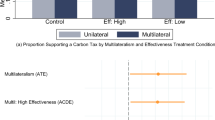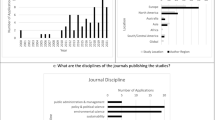Abstract
Lack of progress in global climate negotiations has led scholars to reconsider polycentric approaches to climate policy. Several examples of subglobal mechanisms to reduce greenhouse-gas emissions have been touted, but it remains unclear why they might achieve better climate outcomes than global negotiations alone. Decades of work conducted by researchers associated with the Vincent and Elinor Ostrom Workshop in Political Theory and Policy Analysis at Indiana University have emphasized two chief advantages of polycentric approaches over monocentric ones: they provide more opportunities for experimentation and learning to improve policies over time, and they increase communications and interactions — formal and informal, bilateral and multilateral — among parties to help build the mutual trust needed for increased cooperation. A wealth of theoretical, empirical and experimental evidence supports the polycentric approach.
This is a preview of subscription content, access via your institution
Access options
Subscribe to this journal
Receive 12 print issues and online access
$209.00 per year
only $17.42 per issue
Buy this article
- Purchase on Springer Link
- Instant access to full article PDF
Prices may be subject to local taxes which are calculated during checkout

Similar content being viewed by others
References
Ostrom, E. A Polycentric Approach for Coping with Climate Change Policy Research Working Paper 5095 (World Bank, 2009).
Paavola, J. in Property in Land and Other Resources (eds Cole, D. H. & Ostrom, E.) 417–433 (Lincoln Institute of Land Policy, 2012).
Keohane, R. O. & Victor, D. G. The regime complex for climate change. Persp. Polit. 9, 7–23 (2011).
Cole, D. H. From global to polycentric climate governance. Clim. Law 2, 395–413 (2011).
Stewart, R. B., Oppenheimer, M. & Rudyk, B. Building blocks for global climate protection. Stanford Environ. Law J. 32, 341–392 (2013).
Heal, G. & Kunreuther, H. in Climate Change and Common Sense: Essays in Honour of Tom Schelling (eds Hahn, R. W. & Ulph, A.) 50–60 (Oxford Univ. Press, 2012).
Leal-Arcas, R. Top-down versus bottom-up approaches for climate change negotiations: an analysis. IUP J. Govern. Publ. Policy 6, 7–52 (2011).
Leal-Arcas, R. A bottom-up approach for climate change: the trade experience. Asian J. Law Econ. 2, 1–54 (2011).
Vasconcelos, V. V., Santos, F. C. & Pacheco, J. M. A bottom-up institutional approach to cooperative governance of risky commons. Nature Clim. Change 3, 797–801 (2013).
Victor, D. G. & Raustiala, K. The regime complex for plant genetic resources. Indust. Organ. 32, 147–154 (2004).
Abbott, K. W. The transnational regime complex for climate change. Environ. Plan. C: Govern. Policy 30, 571–590 (2012).
Ostrom, E. Beyond markets and states: polycentric governance of complex economic systems. Am. Econ. Rev. 100, 641–672 (2010).
Ostrom, E. Polycentric systems for coping with collective action and global environmental change. Glob. Environ. Change 20, 550–557 (2010).
Ostrom, V., Tiebout, C. M. & Warren, R. The organization of government in metropolitan areas: a theoretical inquiry. Am. Pol. Sci. Rev. 55, 831–842 (1961).
Aligica, P. D. & Boettke, P. J. Challenging Institutional Analysis and Development: The Bloomington School (Routledge, 2009).
McGinnis, M. D. in Polycentricity and Local Public Economies: Readings from the Workshop in Political Theory and Policy Analysis (ed. McGinnis, M. D.) 1–27 (Univ. Michigan Press, 1999).
Keohane, R. O. & Ostrom, E. (eds) Local Commons and Global Interdependence (Sage, 1995).
De Búrca, G., Keohane, R. O. & Sable, C. Global experimentalist governance. Br. J. Pol. Sci. 44, 477–486 (2014).
Michaelowa, A. Global warming policy. J. Econ. Persp. 17, 204–205 (2003).
Börjesson, M., Eliasson, J., Hugosson, M. B. & Brundell-Freij, K. The Stockholm congestion charges—5 years on. Effects, acceptability and lessons learnt. Transp. Policy 20, 1–12 (2012).
Rotaris, L., Danielis, R., Marcucci, E. & Massiani, J. The Urban Road Pricing Scheme to Curb Pollution in Milan: A Preliminary Assessment Working Paper 122 (Universitá Degli Studi di Trieste, Dipartimento di Scienze Economiciie e Statistiche, 2009).
Schaller, B. New York City's congestion pricing experience and implications for road pricing acceptance in the United States. Transp. Policy 17, 266–273 (2010).
Sabel, C. F. & Zeitlin, J. Experimentalist Governance in the European Union: Towards a New Architecture (Oxford Univ. Press, 2010).
De Búrca, G. New governance and experimentalism: an introduction. Wisconsin Law Rev. 2010, 227–238 (2010).
Barrett, S. Environment and Statecraft: The Strategy of Environmental Treaty-Making (Oxford Univ. Press, 2003).
Prynne, M. UK to fly 45 delegates to climate conference despite no deal being expected. The Telegraph (1 November 2013).
Ostrom, E., Gardner, R. & Walker, J. Rules, Games, and Common-Pool Resources (Univ. Michigan Press, 1994).
Ledyard, J. in The Handbook of Experimental Economics (eds Kagel, J. & Roth, A.) 111–194 (Princeton Univ. Press, 1995).
Helm, D. Climate-change policy: why has so little been achieved? Oxf. Rev. Econ. Policy 24, 211–238 (2008).
Sen, A. K. Isolation, assurance, and the social rate of discount. Q. J. Econ. 81, 112–124 (1967).
Cole, D. H. & Grossman, P. Z. Institutions matter: Why the herder problem is not a Prisoner's Dilemma. Theory Decis. 69, 219–231 (2010).
Cole, D. H. in Distribution of Responsibilities in International Law (eds Nollkaemper, A. & Jacobs, D.) 347 (Cambridge Univ. Press, in the press).
Keohane, R. O. The demand for international regimes. Intl. Organ. 36, 325–355 (1982).
Ostrom, E. A behavioral approach to the rational choice theory of collective action. Am. Pol. Sci. Rev. 92, 1–22 (1997).
Ostrom, E. in Trust and Reciprocity: Interdisciplinary Lessons from Experimental Research (eds Ostrom, E. & Walker, J.) 19–79 (Russell Sage Foundation, 2003).
Cullen, J. B., Johnson, J. L. & Sakano, T. Success through commitment and trust: the soft side of strategic alliance management. J. World Business 36, 223–240 (2000).
Cardenas, J-C., Ahn, T. K. & Ostrom, E. in Advances in Understanding Strategic Behaviour: Game Theory, Experiments and Bounded Rationality (ed. Huck, S.) 258–286 (Palgrave Macmillan, 2004).
Aumann, R. A. & Hart, S. Long cheap talk. Econometrica 71, 1619–1660 (2003).
Volcovici, V. US–China climate deal called “breakthrough” but no long-term cuts yet. Reuters (11 June 2013); http://go.nature.com/QaELce
Special Envoy for Climate Change Report of the US–China Climate Change Working Group to the Strategic and Economic Dialogue (US Department of State, 10 July 2013); http://www.state.gov/e/oes/rls/pr/2013/211842.htm
Landler, L. U.S. and China reach climate accord after months of talks. New York Times (11 November 2014); http://go.nature.com/vdsK6n
Plumer, B. The US and China just reached a major climate deal on cutting emissions. Vox (11 November 2014).
Walton, R. E. & McKersie, R. B. A Behavioral Theory of Labor Negotiations: An Analysis of a Social Interaction System (Cornell Univ. Press, 1965).
Najam, A. in Yearbook of International Co-operation on Environment and Development 1999/2000 (eds Bergesen, H. O., Parmann, G. & Thommessen, Ø. B.) 65–75 (Earthscan, 1999).
Ostrom, E. in Making the Commons Work: Theory, Practice, and Policy (eds Bromley, D. W. et al.) 293–318 (ICS Press, 1992).
McCarthy, S. Bitter recriminations highlight climate-summit rift. Globe and Mail (22 November 2013).
Prins, G. & Rayner, S. Time to ditch Kyoto. Nature 449, 973–975 (2007).
Acknowledgements
Financial support for this project is provided by the Swedish Research Council (FORMAS) grant, COMMONS. My Ostrom Workshop colleagues E. Brondizio and M. McGinnis provided invaluable support and advice. I am grateful to P. Grossman, M. Oppenheimer, B. Rudyk, R. Stewart, M. Vandenbergh, J. Walker and participants in the Workshop on Building Block Strategies for Global Climate Action at NYU Law School (December 2013) for comments and suggestions. Last but certainly not least, P. Lezotte provided exceptional editorial assistance.
Author information
Authors and Affiliations
Corresponding author
Ethics declarations
Competing interests
The author declares no competing financial interests.
Rights and permissions
About this article
Cite this article
Cole, D. Advantages of a polycentric approach to climate change policy. Nature Clim Change 5, 114–118 (2015). https://doi.org/10.1038/nclimate2490
Received:
Accepted:
Published:
Issue Date:
DOI: https://doi.org/10.1038/nclimate2490
This article is cited by
-
From green fingers and green ring to green mitten: Helsinki’s polycentric urbanization and its impact on green structure
Environment, Development and Sustainability (2024)
-
AnthroShift in a warming world
Climate Action (2022)
-
Institutional navigation for polycentric sustainability governance
Nature Sustainability (2021)
-
A well-timed shift from local to global agreements accelerates climate change mitigation
Nature Communications (2021)
-
Multilevel governance in climate change adaptation in Bangladesh: structure, processes, and power dynamics
Regional Environmental Change (2021)



